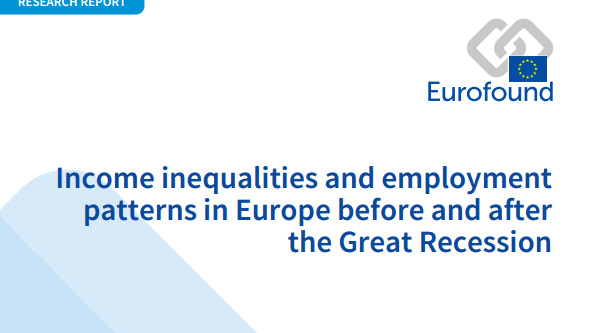
News -
Income inequalities in Europe on the rise since Great Recession
(DUBLIN, IRELAND): Income inequalities have increased in around two-thirds of EU Member States largely due to growing unemployment levels since the onset of the crisis. At the same time EU-wide income inequality also increased as income convergence between European countries stalled– this is according to Eurofound's new report Income inequalities and employment patterns in Europe before and after the Great Recession.
The report is a comprehensive study of income inequalities during the years of the Great Recession starting in 2008–2009, and based on income data for 2005-2013. It presents an EU-wide perspective on the issue and provides an updated picture of inequalities across different sources of income. The results show that EU-wide income inequality declined notably prior to 2008, driven by a strong process of income convergence between European countries – but the Great Recession broke this trend and pushed inequalities upwards both for the EU as a whole and across most countries.
Previous studies have pointed to widening wage differentials as the main driver behind the long-term trend towards growing household disposable income inequalities observed in many European countries; however this report identifies unemployment and its associated decline in labour income as the main reason behind the surges in household disposable income inequalities occurring in recent years.
The impact of the Great Recession on inequalities in household disposable income has not been confined to newer Member States or Mediterranean countries, but has also affected older Member States and northern European countries that have traditionally been more egalitarian, such as Germany, Sweden and Denmark. However, welfare state policies managed to cushion the magnitude of the increases in a number of Member States.
The report shows that the crisis reduced average household disposable real income levels across almost all European countries, although to varying degrees, with the middle classes being significantly squeezed in the majority of countries. It also notes that the impact of the crisis revealed by real household disposable income levels is not always reflected by relative inequality indices or by GDP per capita data, which suggests that a wider set of indicators to assess well-being and economic prosperity in European societies should be adopted in order to properly assess the fall in living standards resulting from the Great Recession.
Publication: Income inequalities and employment patterns in Europe before and after the Great Recession







